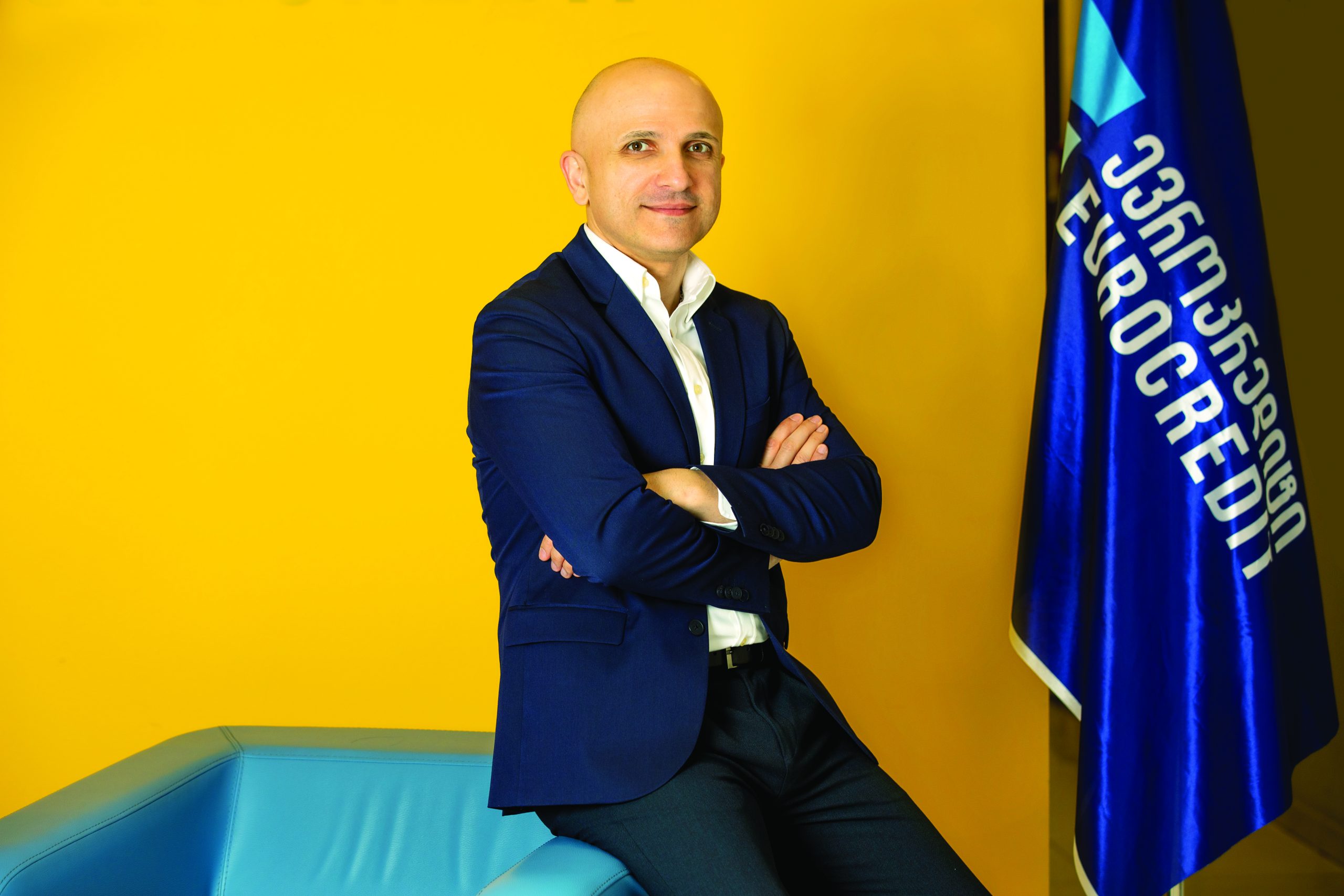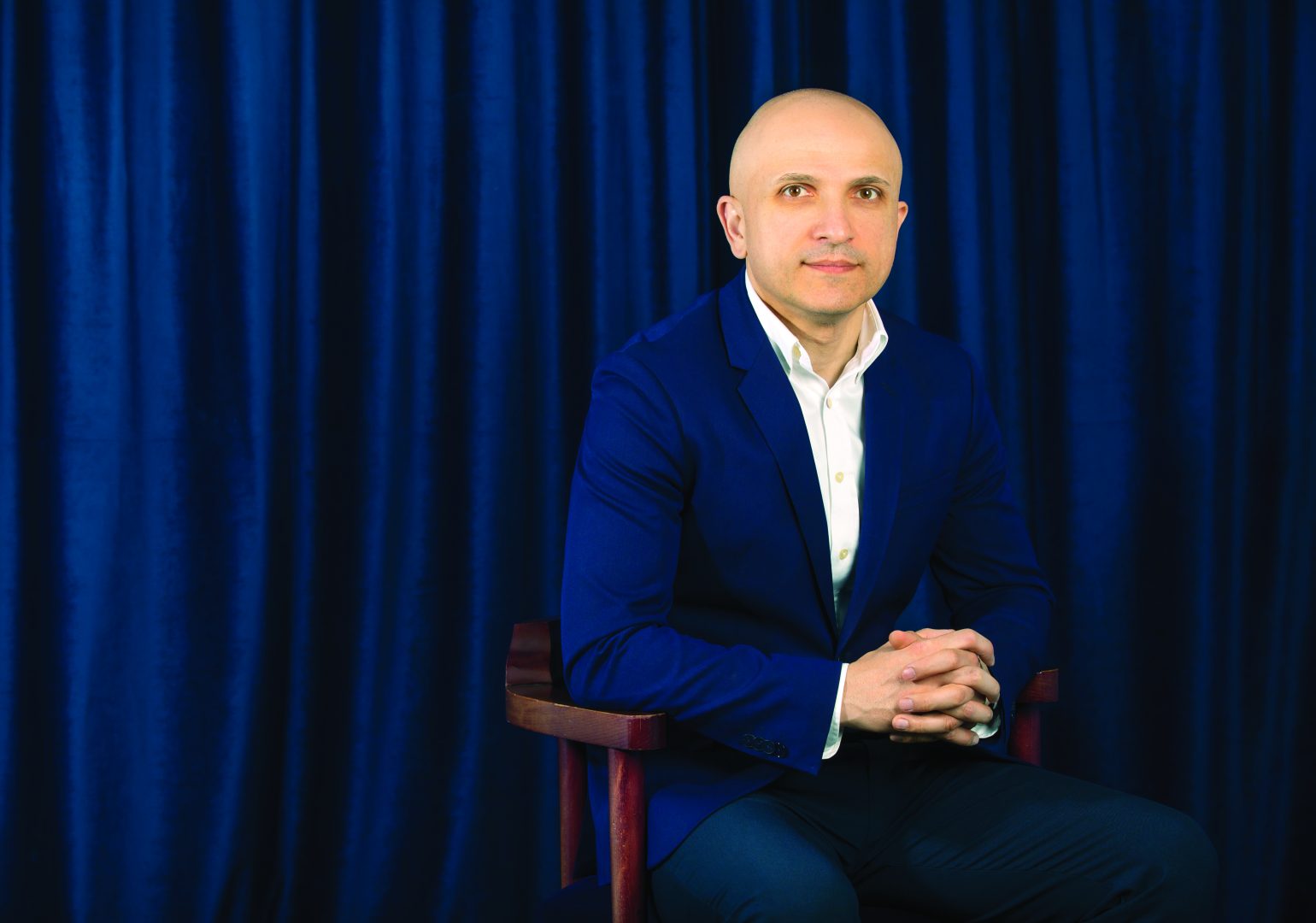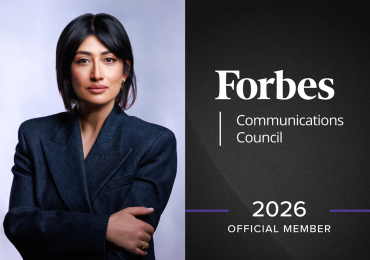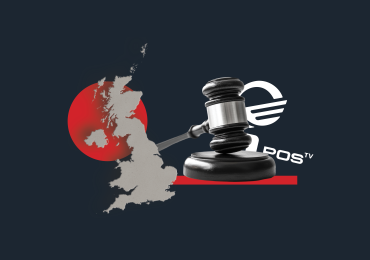Since becoming Eurocredit’s CEO at the end of 2018, Mikheil Nonikashvili has positioned digital transformation at the core of the company’s strategy. Under his leadership, Eurocredit has significantly improved its operational efficiency, resulting in a 67% increase in the loan portfolio and a 53% boost in annual profit. Mikheil Nonikashvili remains firmly committed to this forward-looking approach, confident that it will steer Eurocredit toward becoming a fully integrated fintech company.
By: Iza Gvaramadze
What were your first steps in the financial sector?
To be honest, I had wanted to become a psychologist since childhood and never imagined I would end up working in the financial field. However, I followed my parents’ advice and enrolled in the economics and statistics undergraduate program at Tbilisi State University. Later, I earned a master’s degree in business administration and management at Free University, and last year, I earned a doctorate in management from Caucasus University. While working at Eurocredit, I also fulfilled a long-held dream of studying abroad and earned an EMBA from one of the world’s leading business schools, IE Business School.
Looking back now, I realize that everything turned out for the best. I was lucky because what I do today—management and working with people—is closely related to psychology. At the same time, I try to pursue my personal interests alongside professional development by attending certification programs at leading universities around the world. Two years ago, I completed a certification course in behavioral science at Yale University, and just recently, I completed another certification at Harvard University in the field of fintech. In January of this year, I also completed a course in strategic foresight at the University of Houston. I plan to continue exploring this area, as I was genuinely impressed by the strategic foresight model.
I began working in the financial sector in 2007 while continuing my studies. I took my first career steps at Bank of Georgia, first as a branch manager and later as a project manager in the Digital Channels Development Department. After that, I spent about three years at Finca Bank, where I held the position of Regional Manager.
In 2016, I joined Lendo, a fintech startup founded in Georgia by Latvians. You could say this was the first time I tested myself in the role of CEO. No classroom at even the top universities can compare to this experience in terms of professional growth. During my leadership, within 18 months, the loan portfolio exceeded 50 million euros, and within nine months, we opened 54 service points, significantly improving access to physical and digital channels. In 2018, Lendo became the market leader in its field in terms of portfolio volume. These results were achieved thanks to digital innovation and a well-chosen strategy, as we listened to our customers and combined online services with physical sales points.
You joined Eurocredit in December 2018. What motivated you, and what challenges did you encounter within the company?
The sector was very familiar to me, and the company intrigued me, partly because I had not heard much about it before. Eurocredit has been operating since 2010, and in 2014, the National Bank of Georgia registered it as a microfinance organization, giving it the appropriate license. After that, each team that led the company at different times advanced the company to a certain stage of development, with strategies and visions suited to those specific periods.
However, it seemed that fresh energy and a different perspective were needed.
Given all this, when I took on the role of CEO at Eurocredit, the main challenge was to develop a new strategy for the company. I also saw the need to improve the organizational culture and reshape how the brand was perceived. Naturally, this renewal required a new team, and assembling that team was one of my biggest challenges.
What helped you cope with these challenges?
In a changing and unstable environment, strategic foresight allows us to see not only tomorrow but also more distant perspectives. Peripheral vision and constant scanning of the environment help us gather important information on trends in various industries, and based on analysis, understand what will be in demand in the future. Strategic foresight was precisely what helped me define the company’s direction.
What did strategic foresight show you, and what steps did you take in this direction at Eurocredit?
Today, fintech is not the future of the financial sector; it is the present. The changes we made were in line with this strategy. My arrival at Eurocredit and the start of the transformation coincided with the pandemic period, which accelerated digitization even further. Ultimately, we navigated this period well because we had a plan and acted according to it.
The experience I gained at Lendo in terms of digitization proved very useful. I brought the digital model implemented there to Eurocredit. We automated key internal processes, including risk assessment and overdue loan categorization. The program itself determines which customers should receive an early warning to prevent overdue payment risks. In the second case, the algorithm distributes overdue loans into different packages and automatically connects employees with the loan holder. As a result, tasks that previously required more effort and time resources from company staff became automated.
After I joined the company, Eurocredit’s website was updated twice to enhance the customer experience. We will launch a fully digital refinancing product very soon, allowing customers who are already registered with the company and have signed a contract to take out a loan online automatically. We had similar services before, but through a partner company. Eurocredit plans to digitize all processes entirely, so we decided to offer this product to customers independently, without third-party involvement.
Another change involved the brand’s perception and the meaning of the logo. Initially, I was told that Eurocredit’s logo depicted a jeans pocket where customers would keep the money received from us. However, I saw a seagull flying between the sky and the sea, symbolizing the fulfillment of dreams. We have aimed to reflect this concept in the brand.
Have these changes yielded results? How have the company’s financial indicators changed since your arrival?
All these changes contributed to increased operational efficiency, which has helped us show noticeable progress in various key financial indicators since 2018. For example, we successfully increased the net loan portfolio by 67% during this period, reaching 75 million lari. The average annual profitability indicator also significantly improved—in this case, the average annual growth was 53.1%, and in recent years, it has fluctuated around 12 million lari. Since Kristali and MBC have been transformed into microbanks among microfinance organizations, we rank fourth in loan portfolio size and third in profit.
During the same period, from 2019 to 2024, Eurocredit’s return on equity (ROE) increased from 9.8% to 24.6%, while return on assets (ROA) grew from 4.1% to 15.5%.
I want to emphasize that the entire Eurocredit team contributed to achieving these results.
Since you mentioned the team, let’s talk about the changes in organizational culture.
I take the greatest pleasure in creating (and changing) organizational culture. After reaching a value consensus, this task becomes much easier. The team must be formed accordingly, and a behavioral design must be developed. Every team leader must be consistent and align every decision with the values. Most importantly, the cultural story must be consistently reinforced for both old and new team members.
As I mentioned before, assembling the team was a big challenge. However, I can confidently say that, currently, in Eurocredit, the key positions are occupied by professionals with experience of holding senior positions at leading banks in the country. This is the best team I have ever worked with in my 17-year career in this field. However, it is essential not to overlook that a good professional must also be a good person, and here we have complete alignment. It is necessary to appreciate the work of this team and create the best working conditions for its members. Our company’s motto, ‘Without Barriers,’ reflects both our internal and customer-focused approach. We have already implemented several projects in this regard. One of them is ‘Coffee with the CEO.’ Any employee can schedule a meeting with the CEO by scanning the QR code placed throughout the office and talk to me about any issue.

Additionally, I meet with all employees individually and in teams at least once a year, without managers present. During these meetings, we exchange ideas and discuss their needs. I want to emphasize that I never make important decisions alone. What I love most in this process is having a discussion with the team, which often leads me to the right answers.
To bring team members even closer and enhance their knowledge, we created a book club, where we read and discuss pre-selected books. We recently started publishing a quarterly magazine featuring news and interesting stories, including employee profiles.
The company also actively supports employees’ professional development by funding training courses.
I also want to mention that an important part of Eurocredit’s Environmental, Social and Governance (ESG) strategy is promoting the growth of female employment. Women represent 65% of the company’s employees.
An outstanding feature of Eurocredit’s organizational culture is the flexible work schedule—employees can work remotely one day a week, and instead of the usual 40-hour work week, ours is 35 hours. Additionally, the company fully covers salaries for up to six months of maternity leave.
Everyone’s work must be recognized and appreciated, which significantly increases employee motivation. We aim to refine the organizational culture further to ensure this.
How actively is the company involved in ESG-related projects?
Over the last two years, we have become particularly active in this area. For example, the company finances the tuition fees of high-performing students displaced from Abkhazia and South Ossetia who are studying at university. Since one of our main areas of focus is auto loans, Eurocredit actively supports the development of motorsports. The company sponsors two motorsport federation drivers in local competitions.
Recently, we also became sponsors of the basketball team of my hometown, Kaspi. Kaspi previously did not have a basketball team. The most exciting part is that they can secure a spot in the A League this year and move up to the Super League. When children see this, their motivation increases. Not all of them may become successful basketball players, but with our support, we want to promote sports and a healthy lifestyle.
Furthermore, if we become aware of a family in need of financial assistance, we make it a priority to provide support.
Let’s return to the financial sector. Your main services are business loans and auto loans, which are now also offered to customers by large banks. How do you deal with this challenge?
Competition is intense. The financial sector is already saturated, and two banks occupy a substantial market share, leaving a relatively narrow space for others. These banks are complete fintech companies, with sophisticated digital products and a massive customer base. Competing with them is very difficult.
In recent years, banks have become quite active in the auto loan market. As you know, financial institutions must meet the PTI (Payment-to-Income) ratio, which refers to the proportion of a customer’s income that goes toward loan repayment. In our country, a large portion of the population is at the limit of this ratio and is burdened with loans. In the case of auto loans, this ratio is not required because the loan is secured by the vehicle. This has led to the increased activity of banks in the auto loan market.
Our business strategy is a differentiation strategy, meaning we seek to gain a competitive advantage through the quality of our digital and physical services (simplicity, flexibility, and fewer barriers). Thus, we make the most of the spaces left by large banks or players in the microfinance sector. This is precisely what Eurocredit’s fintech strategy aims to do: create real value that is accessible to customers.
In addition, we strive to develop dynamic competencies. This concept was introduced nearly 30 years ago by the well-known strategist and economist David Teece, who first described it in his 1997 article Dynamic Capabilities and Strategic Management. According to Teece, dynamic capabilities are the organization’s ability to recognize changes in the environment, seize opportunities, and quickly mobilize and transform resources to maintain a competitive advantage in an unstable and volatile environment.
Do you see any challenges in terms of regulation?
The regulatory environment is quite turbulent. We started the company’s fintech transformation about three years ago, but encountered many barriers along the way. I would have liked to see even more proactive steps taken in this direction because the future is unimaginable without fintech tools, and our access to them should not be restricted. More openness and readiness for innovation and new ideas are what we desire and a modern necessity.
Lastly, what are your future plans?
In the future, we are considering actively integrating artificial intelligence into the company’s internal processes, including the decision-making process regarding loans. Research conducted worldwide has shown that there is a significant difference between the decisions made by risk officers regarding loans due to the subjective assessment of the situation, sometimes as much as 40%-70%. AI, however, significantly reduces the errors caused by human factors. The capabilities of artificial intelligence are not limited to just this; its application scope is much broader.
I want to reiterate that our goal is to fully digitize every product and process. Consequently, every step the company takes will be directed towards complete digitization. Fintech is the present. Therefore, implementing this strategy today is not just an option but a privilege and a responsibility.
S











